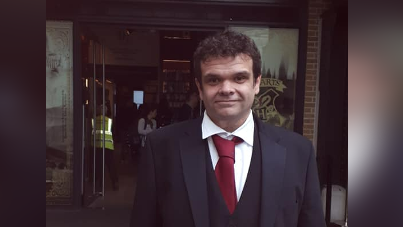'No value' in dyslexia diagnoses, says academic

A university professor is urging experts and educators to stop diagnosing dyslexia.
Durham University professor Julian Elliott believes diagnoses hold "no value" in terms of educational interventions for poor readers.
"Dyslexia can be a helpful term to describe severe and persistent difficulty with reading, but that's it," he added.
The academic's views are disputed by experts including British Dyslexia Association chief executive Chivonne Preston, who said: "A diagnosis does hold value, for the individual, for their learning, for their mental health and for their future."
Prof Elliot, who is an educational psychologist, issued a statement ahead of a speech at the British Dyslexia Association's annual conference.
He said there were many reasons children struggled to read and that it was impossible to divide them into those with dyslexia and those who were poor readers for other reasons.
"There is no form of intervention that is specific for those diagnosed as dyslexic, as opposed to other struggling readers," he added.
Prof Elliott believes diagnoses are not required to put into place "the most effective and early forms of intervention" and said diagnostic processes could exclude struggling readers from support.
"So for all of those reasons, we need to stop diagnosing dyslexia," he said.
"It should be seen primarily as an educational difficulty, not a diagnosable 'medical' condition."

Jamie Sample, from Middlesbrough, was diagnosed with dyslexia in his late teens as he prepared to go to university.
The diagnosis allowed Mr Sample to access support, including specialist software and marking considerations.
"I don't have confirmation yet, but I believe I'm about to graduate with a first-class degree," he said.
"I thought I'd never get to university, let alone get the grades I did and without the support I got because of my diagnosis, I wouldn't have gone."
He said the diagnosis, which came after years of struggling at school, opened doors and helped him to develop ideas in a more understanding environment.
"You have to have evidence of a diagnosis before anything can be put in place," he said.
"If this professor has his way, we could lose some amazing, intelligent people who could come up with a cure for cancer or new technology.
"Without a diagnosis and help, nobody would ever know about the potential of children who don't have a diagnosis."
Defining dyslexia
Ms Preston said the upcoming BDA conference welcomed speakers with varying viewpoints and said Prof Elliott's comments were part of a debate that had been going on "for well over a century".
She said defining dyslexia was complex, that experts agreed there were various causes of reading difficulties that should be identified as early as possible, and that all learners should get the support needed to progress.
"Whilst it is critical that the definition of dyslexia evolves in line with scientific evidence, dyslexia does indeed exist, and dyslexic learners need to be identified and provided with appropriate support," she added.
On behalf of another dyslexia charity, The Dyslexia Association, chief executive Kay Carter said diagnoses should not hold the key to accessing the help and support needed by children with reading difficulties.
But, she said, the effect of formal assessments and diagnoses could be "transformational" for individuals.
Follow BBC Sunderland on X (formerly Twitter), Facebook and Instagram. Send your story ideas to northeastandcumbria@bbc.co.uk.


